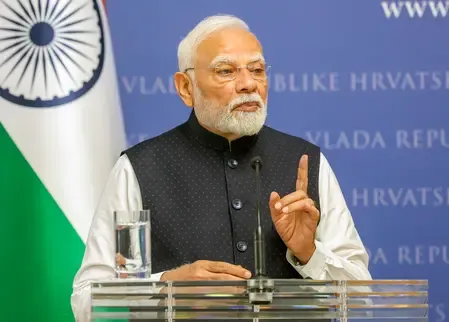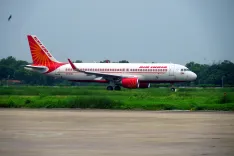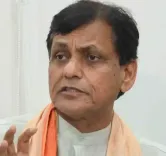Did PM Modi Discuss De-escalation with Iranian President?

Synopsis
Key Takeaways
- PM Modi's call for diplomacy is crucial for stabilizing the Middle East.
- US airstrikes on Iran have heightened tensions globally.
- Iran's condemnation of these strikes reflects its commitment to its nuclear program.
- Dialogue remains essential to avert further escalations.
- Israel's military actions highlight the ongoing conflict in the region.
New Delhi, June 22 (NationPress) Prime Minister Narendra Modi engaged in a conversation with Iranian President Masoud Pezeshkian on Sunday, emphasizing the urgent need for de-escalation and diplomatic efforts to re-establish regional peace in the Middle East.
In a message shared on X, PM Modi stated, "I spoke with President of Iran @drpezeshkian. We thoroughly discussed the current situation and expressed deep concern over the recent escalations. I reiterated our call for immediate de-escalation, dialogue, and diplomacy as the pathway to restoring peace, security, and stability in the region."
This appeal for dialogue coincided with the day the United States conducted airstrikes on three of Iran's nuclear facilities, resulting in significant international backlash. Iran condemned the US strikes as a brutal military aggression and a serious violation of international law and the UN Charter.
Following the US airstrikes on the Fordow, Natanz, and Isfahan nuclear sites, Iran called upon the United Nations and the International Atomic Energy Agency (IAEA) to respond swiftly.
In an official statement, Iran’s Ministry of Foreign Affairs strongly condemned the US's actions, stating, "The Ministry of Foreign Affairs of the Islamic Republic of Iran vehemently denounces the brutal US military aggression against Iran's peaceful nuclear facilities, which constitutes a blatant violation of the fundamental principles of the United Nations Charter and international law, holding the law-breaking US government accountable for the grave consequences of this act."
Earlier, the Israeli Defense Forces (IDF) announced the commencement of a series of strikes targeting military locations in western Iran, following a missile attack from Iran earlier that day.
The IDF reported, "The IAF has initiated a series of strikes aimed at military targets in western Iran," posting updates on X.
Additionally, the IAF targeted missile launchers poised to attack Israeli territory, effectively neutralizing the threats posed by the Iranian Armed Forces.
According to the IDF, Iran launched over 30 ballistic missiles at Israel on Sunday.
Israeli officials claimed their operations against Iran were preemptive measures aimed at thwarting Tehran's pursuit of nuclear weapons, a goal that Iran has consistently denied.






